5 Best AI Search Engines for 2026
Simran Kataria

Choosing the right SEO tool can dramatically influence the success of your digital marketing efforts. In 2025, where Google processes more than 8.5 billion searches per day, getting your content to rank well isn't just a competitive advantage—it’s essential for visibility and growth.
Among the sea of SEO tools available today, three have emerged as top contenders: Semrush, Ahrefs, and Rank Math. Each of these tools serves a unique purpose and audience. Semrush is widely recognized as a comprehensive digital marketing suite, offering everything from keyword tracking to PPC campaign management. Ahrefs, on the other hand, is celebrated for its precise backlink analysis and content gap identification. Meanwhile, Rank Math has carved a niche as the go-to WordPress plugin for real-time, on-page SEO enhancements.
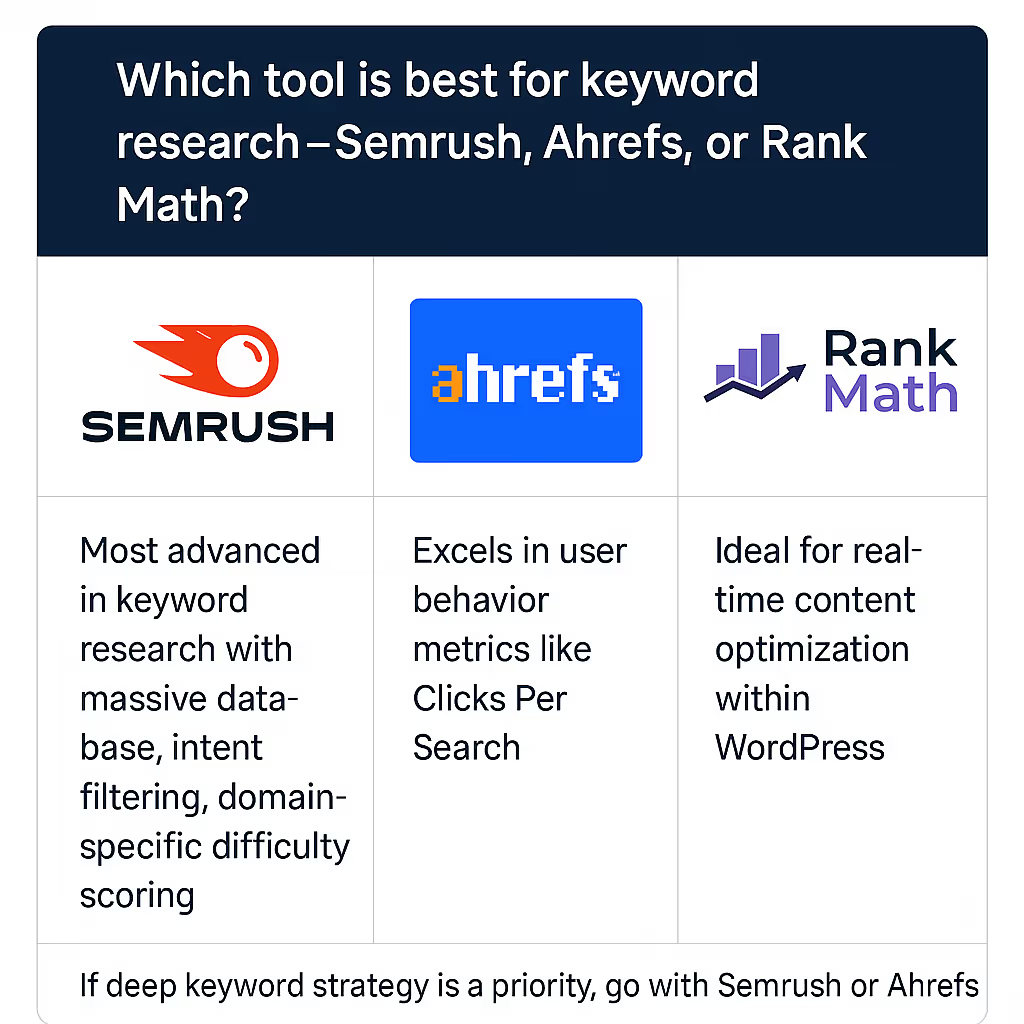
But when budgets are tight and time is limited, how do you choose between them?
This in-depth comparison aims to answer that question. Whether you're an SEO consultant managing client accounts, a content marketer optimizing blog posts, or a small business owner trying to rank on Google without hiring an agency, this guide is for you.
We'll explore each tool’s capabilities in keyword research, backlink analysis, on-page SEO, ease of use, and pricing. We'll also outline specific use cases to help you determine which tool is best suited for your goals—whether you're optimizing for local SEO, creating long-form content, or tracking competitive rankings.
By the end, you’ll have a clear understanding of not only what each platform does, but also which one aligns with your strategic needs in 2025.
Let’s begin by understanding what modern SEO tools are truly expected to deliver today.
Search engine optimization has come a long way from being a manual checklist of keywords and backlinks. In 2025, SEO tools are no longer just utilities for auditing pages—they are strategic partners powered by AI, automation, and real-time analytics. Understanding what a top-tier SEO tool should offer today is key to making an informed decision between Semrush, Ahrefs, and Rank Math.
Modern SEO platforms are expected to do far more than track rankings or suggest keywords. They are now used to:
These tools have become more intelligent and user-centric. For example, platforms like Semrush and Ahrefs now offer AI-driven keyword difficulty metrics and predictive traffic potential. Meanwhile, Rank Math has embedded AI content scoring directly within the WordPress editor, making real-time optimization accessible for bloggers and SMBs.
A recent survey by Statista reported that over 64% of marketers in the U.S. rely on SEO tools to analyze competitor performance and keyword opportunities, highlighting how indispensable these platforms have become.
In this landscape, the “best” SEO tool isn’t just the one with the most features—it’s the one that aligns most closely with your workflow, technical needs, and content goals. That’s what makes comparing Semrush, Ahrefs, and Rank Math so relevant right now.
In the following sections, we’ll take a closer look at each platform individually to evaluate what they offer and who they serve best.
If you're looking for a comprehensive SEO solution that goes beyond keyword tracking, Semrush is likely already on your radar. Often referred to as a digital marketing “Swiss Army knife,” Semrush stands out as a full-service platform covering SEO, content marketing, social media management, PPC, and competitor intelligence.
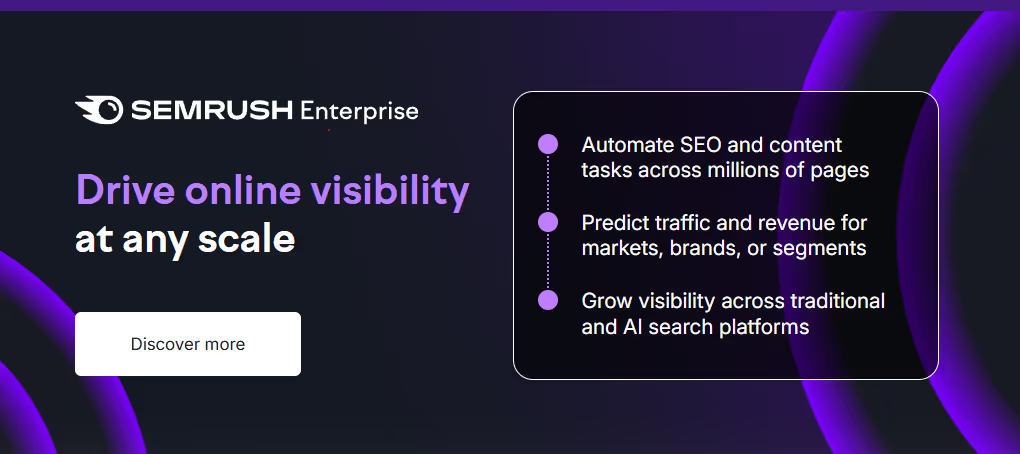
Semrush boasts a vast array of features designed for both SEO professionals and agencies handling large-scale campaigns. Its Keyword Magic Tool alone offers access to over 20 billion keywords with filters based on intent, volume, difficulty, and CPC. You can also generate keyword lists tailored to specific geographies, making it a great fit for multinational campaigns.
Where Semrush really shines is in its competitor analysis. With the Traffic Analytics Tool, users can dissect a competitor’s online presence—organic keywords, paid traffic, display advertising, and even user engagement metrics. The Domain Overview report breaks down the performance of any domain with pinpoint accuracy, allowing marketers to reverse-engineer successful strategies.
Another standout feature is the SEO Writing Assistant, which provides real-time feedback on readability, tone, originality, and keyword placement. This feature is especially beneficial for content teams producing long-form articles or landing pages.
Semrush also includes tools for technical SEO audits, uncovering issues such as crawl errors, site speed problems, and HTTPS implementation. Its integration with Google Search Console and Google Analytics allows you to view search data in one unified dashboard.
Semrush’s advertising tools are equally robust. You can run detailed PPC audits, track competitor ad copies, and even view historical ad campaigns—giving you an edge in paid search strategy.
Pros:
Cons:
Semrush is best suited for:
A case study from Semrush describes how a partner agency helped a small artisan bakery achieve a 460% increase in mobile organic traffic over seven months by conducting detailed competitor research, identifying link-building opportunities, performing site structure optimization, and executing thorough technical SEO audits.
Semrush may not be the cheapest tool on the market, but its robust feature set justifies the investment for those serious about integrated SEO and marketing success.
When it comes to mastering backlinks and gaining deep competitive insights, Ahrefs is widely regarded as the industry leader. With what many experts consider the largest and most frequently updated backlink database in the world, Ahrefs has become the go-to tool for SEO professionals focused on organic growth through content and link strategies.
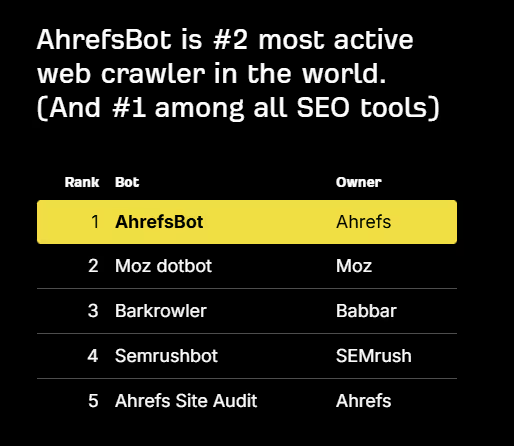
Ahrefs excels in data accuracy, particularly in the areas of backlinks and keyword performance. Its Site Explorer provides a clear picture of any website’s backlink profile, including referring domains, anchor text distribution, newly gained or lost links, and domain authority metrics. In fact, Ahrefs’ crawler is second only to Google in size and reach, indexing billions of pages every day.
For keyword research, the Keyword Explorer is a standout. It doesn’t just show search volume and keyword difficulty—it also includes Clicks Per Search (CPS) and Return Rate metrics, giving users a realistic idea of whether ranking for a keyword will actually drive meaningful traffic. These nuanced insights are what separate Ahrefs from many other keyword tools.
Ahrefs also offers a powerful Content Explorer, allowing users to identify the most linked-to and shared content on any topic. This is especially useful for content marketers trying to reverse-engineer successful articles or blog formats.
The platform’s Rank Tracker monitors your keyword positions across time and provides updates on volatility, SERP features, and competitor fluctuations—all delivered in visually intuitive graphs.
Ahrefs offers site audits as well, flagging common SEO issues like crawl errors, orphan pages, and duplicate content. While it may not be as technically robust as Semrush in some areas, it provides a cleaner, more user-friendly experience for those new to SEO.
Pros:
Cons:
Ahrefs is a top choice for:
A guide from Ahrefs illustrates how using its Link Gap Analysis tool helped identify high-quality link opportunities shared by competitors—resulting in a significant boost in referring domains over a focused outreach campaign.
In essence, Ahrefs is the data-focused SEO specialist’s dream. It may not do everything Semrush does, but it does what it’s built for extremely well.
If your website runs on WordPress and you’re looking for a dedicated SEO plugin that integrates seamlessly into your content workflow, Rank Math is likely your best bet. It’s quickly gained traction as one of the most powerful and user-friendly SEO tools for WordPress users, especially given its extensive feature set—even in the free version.
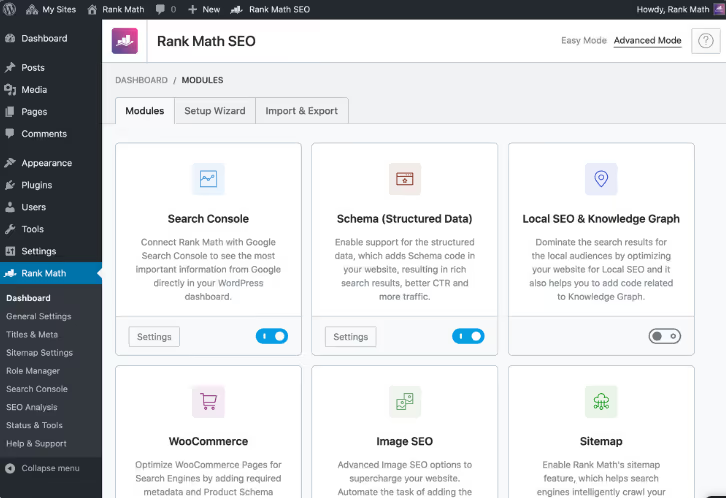
Rank Math’s strength lies in its deep integration with the WordPress ecosystem. From the moment you install it, the plugin becomes a built-in assistant for your content, offering real-time SEO suggestions as you write and edit.
Its Content AI tool, available in the premium version, provides keyword suggestions, readability scores, and optimization checklists right inside your WordPress editor. This live feedback loop simplifies content SEO for bloggers, eCommerce store owners, and small businesses.
Another powerful feature is its schema markup generator, which supports over 800 content types including reviews, how-to guides, recipes, and FAQs. Implementing schema is a major boost for achieving rich snippets in Google’s SERP, and Rank Math automates much of this process.
Rank Math also supports local SEO, integrates directly with Google Search Console, and allows for instant indexing via its API with Bing and Google. The plugin even supports multiple keyword optimization, letting users optimize each page for more than one keyword—an area where many other tools fall short.
What sets Rank Math apart from tools like Semrush or Ahrefs is its ease of use and affordability. It doesn’t try to do everything—there are no backlink audits or PPC analytics—but what it does, it does exceptionally well.
Pros:
Cons:
Rank Math is an ideal tool for:
According to WPBeginner, websites that switched from Yoast SEO to Rank Math saw an average 15-20% boost in organic traffic within the first few months, primarily due to better optimization and schema implementation.
In a market where SEO tools often feel bloated or overly technical, Rank Math remains a lightweight, intuitive solution for the everyday content creator working within WordPress.
When choosing between Semrush, Ahrefs, and Rank Math, it’s crucial to examine how each performs across the core pillars of SEO. Below, we break down the tools by their primary functionalities, offering an apples-to-apples look at where each excels—and where they fall short.
Semrush offers one of the most advanced keyword research platforms in the industry, featuring over 20 billion keywords. It includes intent-based filtering, Keyword Difficulty (KD%), and proprietary metrics like Personal Keyword Difficulty (PKD%) that adapt to your domain's performance. Semrush also shines in its Keyword Gap tool, which helps you identify missed opportunities by comparing your domain against competitors.
Ahrefs may not have the breadth of Semrush’s database, but it excels in click-through rate (CTR) forecasting with its Clicks Per Search (CPS) and Return Rate metrics. Its Keyword Explorer is particularly useful for long-tail keyword research and surfaces keyword suggestions based on platforms like YouTube, Amazon, and Bing, making it more versatile for content creators focused on multimedia and eCommerce.
Rank Math is built for real-time, on-page SEO. It lacks the research depth of Semrush or Ahrefs but provides intuitive keyword suggestions directly within the WordPress editor using its Content AI tool. For bloggers and small businesses who focus on writing rather than data analysis, this embedded guidance can be a huge time-saver.
Winner: Semrush for breadth and analytics; Ahrefs for quality and usability; Rank Math for WordPress-based real-time support.
Ahrefs is considered the gold standard here. Its backlink database is second only to Google, with frequent updates, deep insights on referring domains, and tools to track new, lost, and broken backlinks. It also includes anchor text analysis, domain authority trends, and the ability to perform comprehensive competitor backlink audits.
Semrush has strong capabilities as well, including a Backlink Audit Tool, Toxic Link Detection, and Disavow Recommendations. While its backlink index is smaller than Ahrefs', it still delivers actionable data for growing a clean and effective backlink profile.
Rank Math doesn’t offer backlink analysis at all. It focuses on content and on-page SEO, so you’ll need to pair it with another tool for off-site link-building campaigns.
Winner: Ahrefs, by a wide margin.
Rank Math dominates this category thanks to its real-time optimization features within the WordPress editor. Users receive dynamic scores and suggestions for keyword usage, title tags, internal links, image alt attributes, and schema markup as they write.
Semrush offers on-page optimization through its SEO Content Template and SEO Writing Assistant, which integrate with Google Docs and WordPress. It uses competitor data to recommend content structure and keyword usage.
Ahrefs provides a Content Gap Tool and a decent Site Audit feature but lacks integrated, real-time content optimization. It’s more focused on evaluating performance post-publication rather than guiding you during content creation.
Winner: Rank Math for real-time optimization, Semrush for guided SEO content strategy.
Semrush leads with its robust Site Audit tool, which checks for over 130 technical issues including crawlability, HTTPS, site speed, and mobile usability. It also provides a technical SEO health score and fix suggestions.
Ahrefs also offers excellent auditing features, including duplicate content detection, crawl budget optimization tips, and broken internal/external link identification. Its visual reports make it accessible to both beginners and advanced users.
Rank Math includes basic health checks and indexing status indicators but lacks the depth needed for full-site audits.
Winner: Semrush, followed closely by Ahrefs.
Semrush is ahead here with its AI-powered SEO Writing Assistant, Topic Research Tool, and integration into Google Docs. These features are especially valuable for editorial teams building SEO-friendly content calendars.
Rank Math’s Content AI is competitive, offering real-time guidance as you write. It’s especially handy for solo bloggers and freelancers.
Ahrefs does not currently offer AI content tools. It focuses more on identifying content gaps and analyzing existing pages for backlink potential.
Winner: Semrush, with Rank Math close behind for WordPress users.
Semrush and Ahrefs both offer daily rank tracking across devices, regions, and SERP features (Featured Snippets, People Also Ask, etc.). Their dashboards are rich with insights on volatility and competitive shifts.
Rank Math includes basic rank tracking within its WordPress dashboard, but it lacks multi-location or device-specific insights.
Winner: Semrush and Ahrefs (tie), with Rank Math suited for basic tracking needs.
Beyond core SEO functionalities, Semrush, Ahrefs, and Rank Math each offer unique capabilities that cater to different users. These distinguishing features often tip the scales for professionals deciding which tool to adopt long-term.
Semrush’s most powerful differentiator is its all-in-one marketing platform. In addition to its SEO tools, it includes:
These tools make Semrush a true Swiss Army knife for digital marketing teams needing cohesion across content, paid media, and organic strategies.
While Ahrefs doesn’t try to be everything, it excels in its niche—providing the most reliable SEO data for backlinks and content. What makes Ahrefs unique?
For professionals focused strictly on SEO—not PPC or social media—Ahrefs remains a lean, focused, and highly effective choice.
Rank Math’s innovation lies in its deep WordPress integration. Unlike standalone platforms, it works directly in the WordPress dashboard, which dramatically reduces the need for tab-switching or manual syncing.
For solo creators and small businesses, especially those in eCommerce or blogging, Rank Math’s built-in features eliminate the need for multiple plugins.
Not all SEO tools are created equal—and more importantly, not all SEO users have the same needs. Whether you're a digital agency managing dozens of clients or a local business owner trying to rank on Google Maps, the right tool can make your job exponentially easier. Here's a breakdown of who should use Semrush, Ahrefs, or Rank Math, based on specific scenarios.
Best Choice: Semrush
Agencies and marketing professionals who juggle SEO, PPC, and social media need a versatile, centralized toolkit. Semrush is tailor-made for this group, offering:
Its unified dashboard enables campaign managers to coordinate strategies across multiple platforms without switching tools. If you're running performance-driven campaigns for clients across various industries, Semrush’s comprehensive coverage is hard to beat.
Best Choice: Ahrefs
If your work revolves around technical audits, backlink strategy, and organic traffic growth, Ahrefs is your ideal companion. Its superior backlink database, detailed SERP history, and site explorer features make it indispensable for:
SEO experts and consultants often prefer Ahrefs for its precision, speed, and minimal distractions from non-SEO features.
Best Choice: Rank Math
For individuals and small teams using WordPress, Rank Math offers everything needed to execute on-page SEO efficiently—without the need for a steep learning curve or significant budget.
Rank Math is ideal for bloggers, freelancers, and business owners who want their content to be search-optimized but don’t have time to dig into dashboards or third-party analysis tools.
Best Choice: Rank Math (with support from Semrush or Ahrefs)
Local businesses targeting customers through maps, reviews, and regional search terms will benefit most from Rank Math’s local SEO module. However, pairing it with a tool like Semrush (for keyword tracking and competitor analysis) or Ahrefs (for link building in local directories) provides a well-rounded approach.
Best Choice: Combination of Rank Math and Semrush
Rank Math’s WooCommerce features are excellent for optimizing individual product pages. For campaign-level oversight—including traffic sources, seasonal trends, and ad performance—Semrush fills in the gaps with its marketing suite.
To make your decision easier, here's a head-to-head comparison of the most important features across Semrush, Ahrefs, and Rank Math. This table encapsulates what each tool offers and where they stand out.
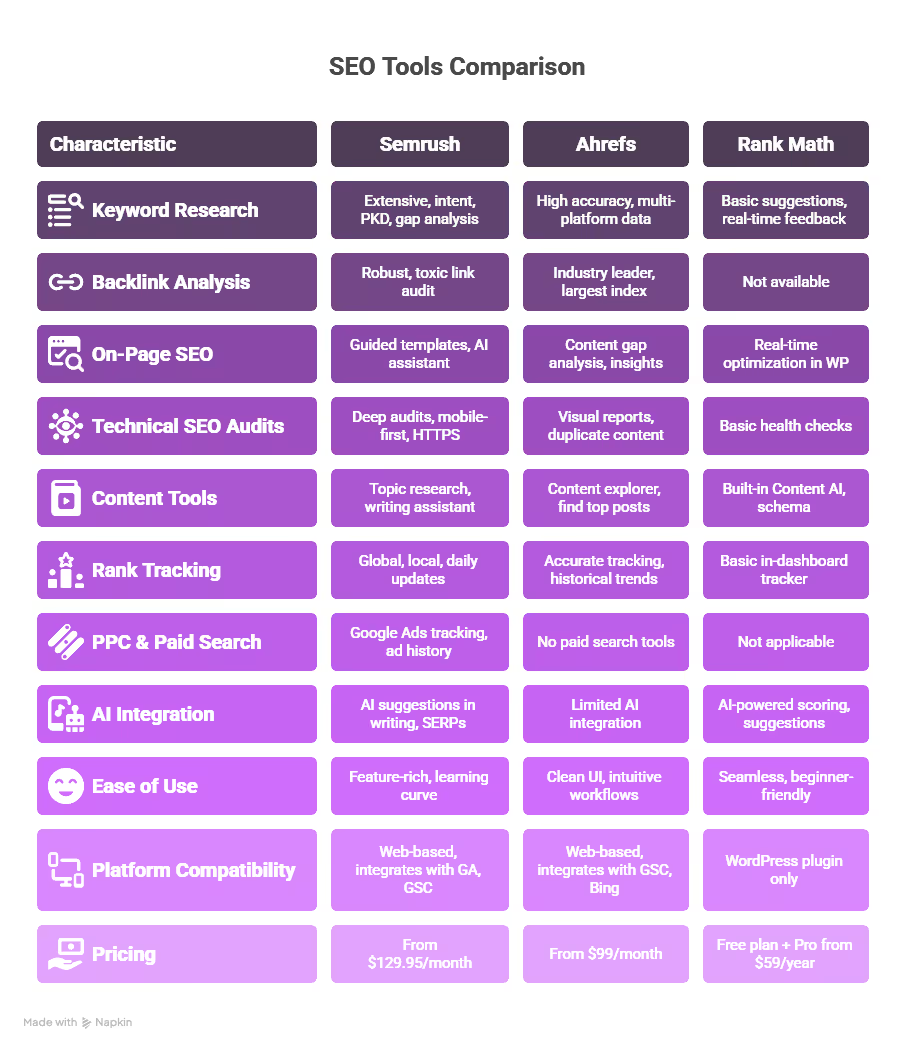
This comparative overview reinforces the idea that no one tool fits all. Each excels in its own niche, and the best choice depends on your current tech stack, marketing goals, and user experience.
A side-by-side look at the pros and cons of each tool helps distill what really matters—functionality, usability, and value for money. Use this quick-glance chart to determine which solution best aligns with your digital marketing needs.
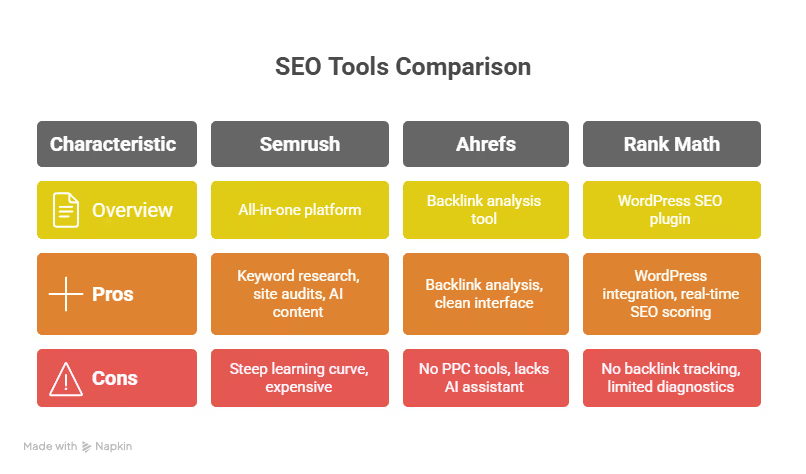
While Semrush and Ahrefs appeal to data-driven professionals, Rank Math shines in accessibility and cost-efficiency, especially for content creators using WordPress. These distinctions become even clearer when we address the most common questions from users weighing these tools.
Semrush is the most advanced in keyword research with its massive database, intent filtering, and domain-specific difficulty scoring. Ahrefs excels in user behavior metrics like Clicks Per Search, while Rank Math is ideal for real-time content optimization within WordPress. If deep keyword strategy is a priority, go with Semrush or Ahrefs.
Not entirely. While Rank Math is excellent for on-page SEO and offers built-in schema, it lacks the off-page capabilities like backlink tracking and competitive analysis provided by Ahrefs and Semrush. Many professionals pair Rank Math with one of the others for a complete SEO solution.
Yes. Ahrefs has the largest and most updated backlink database and offers unmatched detail for link-building campaigns. It’s the go-to choice for SEO experts focused on growing authority through strategic backlinks.
Rank Math takes the crown here. Its seamless WordPress integration, real-time guidance, and easy-to-understand scoring make it ideal for bloggers, solopreneurs, and small business owners without technical SEO expertise.
Absolutely. In fact, many agencies use Semrush for campaign management and Ahrefs for backlink analysis, while content creators often pair Rank Math with Ahrefs for complete coverage of on-page and off-page SEO.
If you're on a budget or just starting out, Rank Math’s free version is incredibly feature-rich. However, for agencies or serious marketers needing advanced features, Semrush offers the most comprehensive toolset—albeit at a premium. Ahrefs is a middle-ground option with pinpoint SEO insights but no multi-channel support.
There’s no universal winner here—only the best tool for your unique goals.
Choose Semrush if you’re running multi-faceted campaigns that require SEO, content strategy, PPC, and social media integration. Its AI capabilities and depth make it ideal for agencies and full-service marketers.
Opt for Ahrefs if your focus is strictly SEO, especially link building and competitive analysis. It’s faster, more accurate, and trusted by professionals for a reason.
Go with Rank Math if you’re a WordPress user looking for smart, real-time SEO optimization on a budget. It simplifies complex tasks and helps content rank better—right from your dashboard.
At the end of the day, the smartest strategy might be a combination—Rank Math for on-page SEO, and either Semrush or Ahrefs for the rest.
If you're ready to elevate your site with a holistic, performance-driven SEO strategy, we recommend working with experienced professionals. Visit Ballistic Design Studio—your trusted partner for cutting-edge SEO and web solutions tailored to today’s competitive digital landscape.


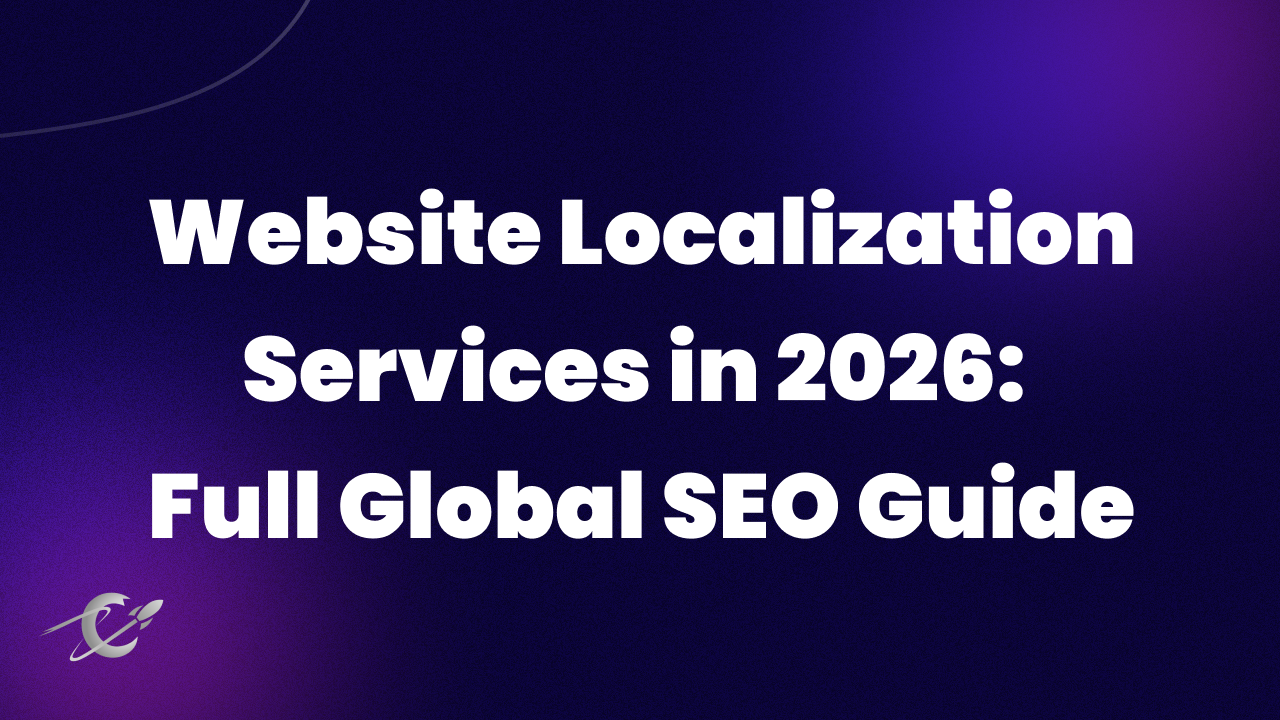

Only valid for-